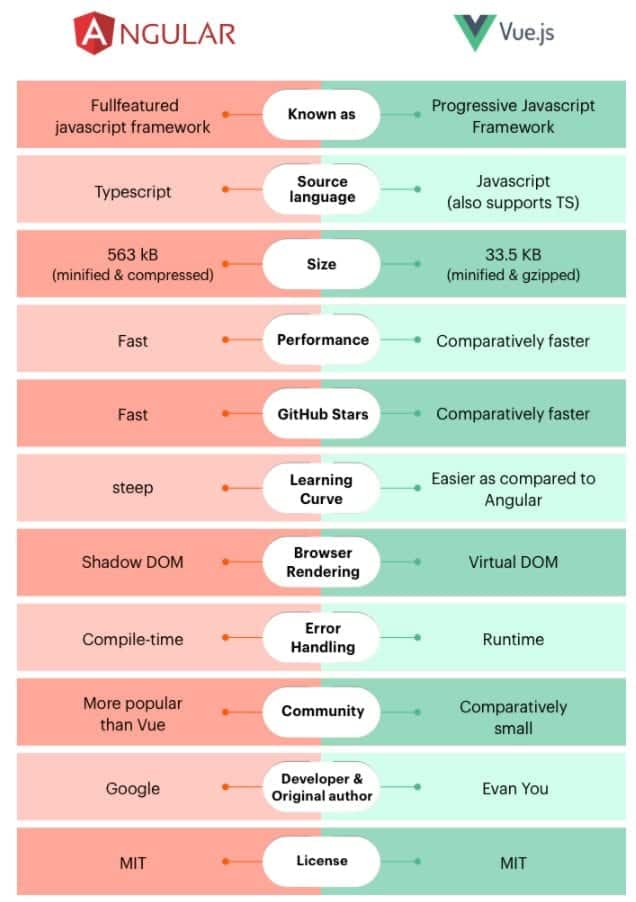
The amount of frontend frameworks available to developers has surged over the last decade. The cause?
Single page applications: Web apps that interact with the user by rewriting the current web page with new data from the web server, instead of the default method of the browser loading entire new pages – wikipedia.
This concept caused JavaScript frameworks to evolve rapidly and thus Angular and Vue were born. Angular is one of the most popular JavaScript frameworks currently available. It was created by Google back in 2010 and is now on version 10. Vue is the newer kid on the block. Evan You, a former core Angular team member at Google, released the open-source framework in 2014.
 https://www.simform.com/angular-vs-vue/
https://www.simform.com/angular-vs-vue/
Single-page applications changed the game with no page reload wait times. Within these apps, JavaScript controls everything the user can see in the browser. SPAs are obviously popular due to their smooth and fast nature. Google took notice and created Angular explicitly for SPA creation. Angular’s use of TypeScript and other built in tools and services make SPA creation a dream for the experienced developer. In addition, Angular is an ideal choice for enterprise companies due to its association with Google. PayPal, AT&T, NBA, and Tesla all boast impressive Angular websites. Alternatively, Vue is made to move quicker. It can handle small to midsize SPAs, but can also bring significant complexities to the table during larger projects due to its extreme flexibility.
Angular has been at the popular table for some time now and Vue really didn’t start gaining popularity until 2016. Some people prefer to judge a framework’s popularity by the number of downloads, but others are more interested in sheer enthusiasm throughout the development community. So, who stacks up?
It’s no secret that Angular competes for market share with Facebook’s frontend framework React. Both frameworks consistently have more downloads than Vue. And although Angular has gained tremendous popularity over the years due to constant updates and releases, it also suffered a huge loss when AngularJS updated to Angular. The differences between the two were vast and the migration was tedious and cumbersome, which caused many developers to abandon the framework and never look back. However, there is still an advantage to Angular when it comes to problem-solving. There is rarely any issue that you’ll run into with the framework that isn’t easily overcome by a simple Google search.
The open source community drives Vue, which increases its popularity amongst developers. Enthusiasm is at an all time high and a popular topic across many chats, Github repositories, and popular developer discussion forums. In addition, Vue boasts an impressive 3X as many stars on Github when compared to Angular. This may lead to a surge in Vue developers in the next few years.
The size and the learning curve that each needs are two of the most notable differences between the frameworks.
First, let’s look at Vue. Vue is small and compact with a 23k file size causing many sources online to claim that Vue is the ‘learning language’ for Angular. However, I don’t agree with that sentiment at all. As mentioned before, Vue is a capable, lightweight, easy to learn SPA framework for small to mid-sized apps. In addition, Vue provides higher customization when compared to Angular and hence is easier to learn. Developers can even start building apps with Vue without having a deep knowledge of JavaScript. The framework focuses on developing highly interactive user interfaces by providing a vast set of tools. However, the simplicity and flexibility is a double-edged sword since it allows for poor and unorganized coding, making it difficult to debug and test.
Angular admittedly has a steeper learning curve at a 143k file size. But, that’s because it’s truly a complete solution. Although developers have to be very confident in their knowledge of JavaScript and mastering Angular requires devs to learn associated concepts like TypeScript and MVC, it’s well worth it. The results are almost always visually appealing and extremely user friendly applications.
Angular uses advanced change detection mechanisms and ahead-of-time compilations to reduce the number of times the document object model manipulates and pre-compiles HTML/app components. This is before the browser even downloads and uses them. The framework is privileged to have these advanced mechanisms ready for optimizing the performance lag.
Vue, with the help of the virtual DOM mechanism, has sorted a default performance-optimized configuration. This way, the runtime and initial load time are reduced drastically, boosting the app performance substantially. The virtual DOM provides more efficient ways to update the view. Each time the application data changes, it renders the virtual DOM rather than rendering the user interface in the actual document object model, which is faster and more performant.
To sum it up, it really comes down to the size of the project you’re anticipating and your ability to find the right team to develop the application. Both Vue and Angular are excellent choices for frontend development with their own strengths and weaknesses. If you’re an enterprise organization, I’d recommend Angular. Small and scrappy start-up with a love for open-source software? Vue’s probably more your vibe.
Click to Learn More or Download Vue.js
Click to Learn More or Download Angular

About the Author: Alfredo Escalante
Alfredo is a number8 consultant and software developer with 5+ years of experience in web development. Alfredo’s preferred tools include JavaScript, Angular, Ruby, and Kotlin.
Provide your information to talk with a number8 Account Executive about your development needs today and feel what it’s like to be listened to before being sold a solution.
Let us help you add highly skilled, versatile developers to your team.